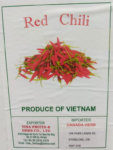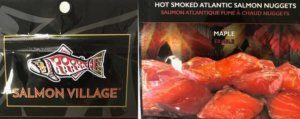The Canadian Food Inspection Agency (CFIA) announced that Canada Herb recalled Hello Fresh Canada Herb brand Red Chili from the marketplace due to possible Salmonella contamination. This product may have also been sold in bulk or in smaller packages with or without a label and may not bear the brand or product name described. Products recalled include Red Chili Ingredient included in certain Hello Fresh brand and Chefs Plate brand Meal Kits. There have been no reported illnesses associated with the consumption of this product. The products were sold Canada/Manitoba, Ontario, Quebec, New Brunswick, Nova Scotia, Prince Edward Island, Newfoundland, and Labrador. The product might have been included as a spice in home-delivered meal kits. The agency did not report how the Salmonella was discovered. The red peppers are originally a product of Vietnam. @ http://www.inspection.gc.ca/about-the-cfia/newsroom/food-recall-warnings/complete-listing/2019-01-20/eng/1548038033402/1548038035281
ruth
Canada Herb is recalling Canada Herb brand Red Chili from the marketplace due to possible Salmonella contamination.
ruth
U.S. PIRG Education Fund issued a report indicating that the number of food recalls has been increasing from 2013 to 2018. In meat and poultry, class1 recalls had an 83% increase. However, recalls from produce had only 2% increase since 2013. All food recalls increased by 10%. Technology such as Whole Genome Sequencing (WGS) helped link together infections. This may explain some of these findings, but not all. The report talks about improvement needed in the recall system. In some cases some stores failed to remove recalled foods or took a long time to do so, raising concerns about the efficiency of the current system. The splits primary responsibility for different foods between the USDA’s Food Safety and Inspection Service (FSIS) and the FDA caused inconsistent oversight, ineffective coordination, and inefficient use of resources. The report recommends setting specifications for irrigation water. Establish clear enforcement consequences for recurring violations of food safety. Declare antibiotic-resistant strains of Salmonella as an adulterant in meat and poultry. Improve traceability throughout the food supply chain through network-based tracking technologies. Require disclosure of retailers selling products for all Class I and Class II recalls, establish a timeline for release of that information, and include packaged goods. Grant USDA mandatory recall authority for contaminated food. Penalize companies who continue to sell products after a recall. Develop programs for retailers to directly notify customers about food recalls. @ https://uspirg.org/sites/pirg/files/reports/WEB_USP_Safe-Food-Report_Jan19.pdf
https://uspirg.org/sites/pirg/files/reports/WEB_USP_Safe-Food-Report_Jan19.pdf
ruth
The Canadian Food Inspection Agency (CFIA) announced that Delta Pacific Seafoods recalled maple-flavored Salmon Village-brand Hot Smoked Atlantic Salmon Nuggets sold in 150-gram packages from the marketplace due to possible Listeria monocytogenes contamination. This recall was triggered by CFIA test results. The recall applies to Alberta, B.C., Manitoba, and Saskatchewan. There have been no reported illnesses caused by the product. @ https://www.inspection.gc.ca/about-the-cfia/newsroom/food-recall-warnings/complete-listing/2019-01-17/eng/1547779415158/1547779417014
https://www.inspection.gc.ca/about-the-cfia/newsroom/food-recall-warnings/complete-listing/2019-01-17/eng/1547779415158/1547779417014
ruth
According to the CDC in the US, drug-resistant infections sicken more than two million people every year, and kill upwards of 23,000. In 2018 alone, pharma giants Novartis, Sanofi and Allergan all sold off or closed up their antibiotics divisions. Janssen Pharmaceuticals (a division of Johnson & Johnson) announced an $818 million deal with a small CRISPER startup called Locus Biosciences to develop a radical new way to develop antibiotics, without causing resistance. Locus has designed CRISPR systems to target critical stretches of DNA, using an enzyme called Cas3 that shreds the DNA. Once loaded into phages and delivered to a patient, the CRISPR system would only prey on the bacteria causing the infection. The company’s scientists hope to avoid any possibility of evolving resistance by targeting multiple indispensable genes. @ https://www.wired.com/story/antibiotics-are-failing-us-crispr-is-our-glimmer-of-hope/
Antibiotics are still massively overprescribed, a new study shows. With no new drugs in sight, some scientists are turning to Crispr for a reboot.


